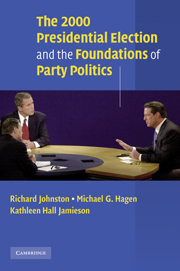Book contents
- Frontmatter
- Contents
- Acknowledgments
- 1 Introduction
- 2 The Evolution of Vote Intentions
- 3 The Landscape
- 4 Ads and News: The Campaign as a Natural Experiment
- 5 The Economy, Clinton, and the First Phase
- 6 Candidate Traits and the Second Phase
- 7 Social Security and the Third Phase
- 8 Conclusions
- Appendix
- References
- Index
6 - Candidate Traits and the Second Phase
Published online by Cambridge University Press: 28 May 2010
- Frontmatter
- Contents
- Acknowledgments
- 1 Introduction
- 2 The Evolution of Vote Intentions
- 3 The Landscape
- 4 Ads and News: The Campaign as a Natural Experiment
- 5 The Economy, Clinton, and the First Phase
- 6 Candidate Traits and the Second Phase
- 7 Social Security and the Third Phase
- 8 Conclusions
- Appendix
- References
- Index
Summary
The first phase of the general-election campaign came to an end when the electorate abruptly revised its estimation of Al Gore's character, of his honesty in particular. Although the shift cannot be attributed to any major public event, it was no accident. The ground was laid, we believe, by themes in Republican ads, including focused attacks on Al Gore in early September. The ad campaign did not register directly with the electorate. Rather, it supplied language that then infused news coverage of Gore in late September, and a series of negative stories about Gore caused many citizens to reevaluate him. This manifested itself in precipitate drops in ratings of various facets of his personality. The deepest drop came in estimations of Gore's honesty, the thematic heart of the Republican ad campaign and of the negative press coverage.
This chapter adds a dynamic twist to accounts of personality in elections. The literature on perceptions of candidates' personality traits is modest but seems to be pointing toward a consensus. Voters make personality comparisons that are not just the residue of prior partisan and ideological commitments, although party and ideology do color personality judgments. And these personality comparisons affect the vote, at least at the margin. But few candidates are outstandingly superior on any evaluative dimension of personality. If they are, this advantage may be offset by relative judgments on another dimension. By the end, this was certainly true of the 2000 election, as Bartels (2002) has already shown.
- Type
- Chapter
- Information
- Publisher: Cambridge University PressPrint publication year: 2004



